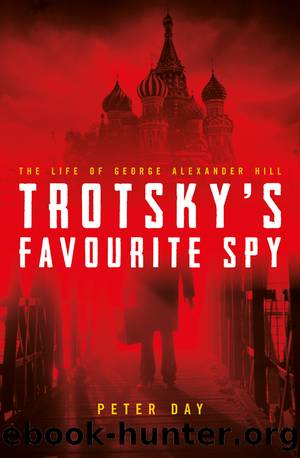Trotsky's Favourite Spy by Day Peter;

Author:Day, Peter;
Language: eng
Format: epub
Publisher: Biteback Publishing
CHAPTER 10
GRAND DESIGNS
The announcement of a Soviet-German non-aggression pact on 23 August came as an unpleasant surprise to Neville Chamberlainâs Conservative government. The shock waves rippled on throughout the war: the uncertainty and ambiguity that had been a hallmark of British policy towards the Bolshevik regime in 1917 was replicated in 1939.1
In contrast, Germanyâs invasion of Poland was a shock, but hardly a surprise. After six years of appeasement, Prime Minister Chamberlainâs declaration on national radio at 11 a.m. on 3 September that Britain was at war was a defining moment. While there were still some who hoped for a last-minute reprieve or accommodation, none could doubt Hitlerâs megalomaniac tendencies, his mendacity or his willingness to provoke a blood-letting conflict across Europe. Where Russia was concerned, there was no similar clarity of purpose.
Two weeks after Hitler had provoked a European war by his invasion of Poland from the west, Stalin sent his Red Army in from the east with impunity. The War Cabinet had been warned by the Foreign Secretary on 13 September that the Soviets âmight desire to secure a portion of Polish territoryâ and that the chances of them coming to Polandâs aid against Germany were âunpromisingâ. When they heard on 17 September that the occupation had begun at 6 a.m. that day, ostensibly to protect the White Russian community in a country with no recognisable government, the Cabinet simply took note and breathed a collective sigh of relief because Britainâs commitment to defend Poland against aggression was only effective with regard to Germany. While the Prime Minister publicly expressed indignation, the Cabinet shrank from an official protest.2
A week later, the First Lord of the Admiralty, Winston Church-ill, suggested to his Cabinet colleagues that Russiaâs action might prove beneficial in the long run because Hitler would not be able to trust his new-found friends. He would be obliged to tie up twenty-five army divisions to secure his new Polish border. Churchill argued in favour of maintaining diplomatic relations with âneutralâ Russia and predicted to their ambassador in London, Ivan Maisky, that they would end up fighting on the same side. In a BBC broadcast on 1 October, he referred to Russiaâs community of interest with Britain and France and famously described the country as: âa riddle wrapped in a mystery inside an enigmaâ. This puzzle proved beyond Britainâs capacity to solve, as politicians, military and secret services twisted and turned to little avail.
There were three incompatible elements to resolve: economic, military and political. Britain needed to maintain a trading relationship with Russia, among other things to guarantee supplies of timber. It was still widely used in aircraft construction, notably in the de Havilland Mosquito fighter bomber, and there was increased demand in the shipbuilding, transport and construction industries. Later, when Russia entered the war on the Allied side, Britain reciprocated with supplies of military hardware, paid for in part with gold that was desperately needed for Britainâs dwindling reserves. Militarily, Britain and France could not withstand the might of Germanyâs armed forces while Russia stood aloof from the conflict.
Download
This site does not store any files on its server. We only index and link to content provided by other sites. Please contact the content providers to delete copyright contents if any and email us, we'll remove relevant links or contents immediately.
Blood and Oil by Bradley Hope(1476)
Wandering in Strange Lands by Morgan Jerkins(1294)
Ambition and Desire: The Dangerous Life of Josephine Bonaparte by Kate Williams(1294)
Daniel Holmes: A Memoir From Malta's Prison: From a cage, on a rock, in a puddle... by Daniel Holmes(1260)
It Was All a Lie by Stuart Stevens;(1210)
Twelve Caesars by Mary Beard(1163)
The First Conspiracy by Brad Meltzer & Josh Mensch(1092)
What Really Happened: The Death of Hitler by Robert J. Hutchinson(1083)
London in the Twentieth Century by Jerry White(1062)
Time of the Magicians by Wolfram Eilenberger(1039)
Twilight of the Gods by Ian W. Toll(1033)
The Japanese by Christopher Harding(1030)
A Woman by Sibilla Aleramo(1019)
Cleopatra by Alberto Angela(1011)
Lenin: A Biography by Robert Service(994)
The Devil You Know by Charles M. Blow(942)
Reading for Life by Philip Davis(935)
1965--The Most Revolutionary Year in Music by Andrew Grant Jackson(880)
The Life of William Faulkner by Carl Rollyson(876)
